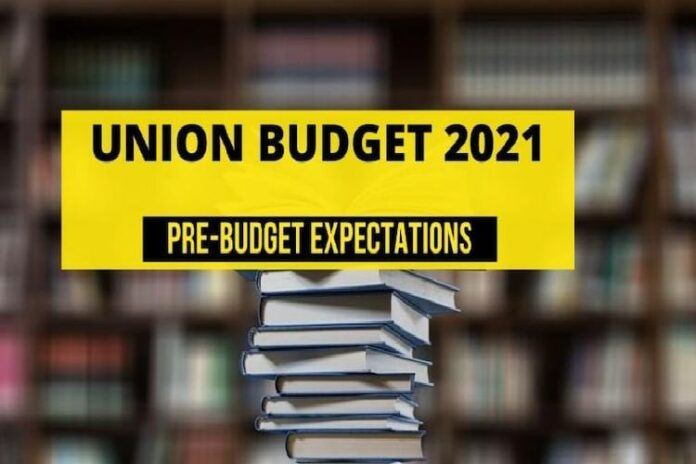As the countdown for the Union Budget 2021 has begun, all eyes are now set on how the Finance Minister’s attempts to walk the tightrope to strike a balance and play the role of a catalyst in the unprecedented time of the pandemic crisis.
Finance Minister Sitharaman last week said the forthcoming Budget 2021 will be like no other in the past and will help India emerge as the engine for global growth. Amid the current situation, there is a pressing need to strengthen the engines of growth and promote the economy by enhancing consumer spending, revive demand and boost the ease of doing business in India to seize the space being vacated by some other consumption led economies.
With this backdrop to bring the Covid- battered economy back on track, we have encapsulated below few expectations of the common man and Industry at large from the Union Budget 2021:


In order to augment private consumption and increase disposable income in the hands of people to revive demand, the Government may consider revising upwards the direct income tax slabs for Individuals and reduction in non-corporate income-tax rates. Further, the overall investment limits under Section 80C of the Income-tax Act, 1961 (Act) should be enhanced to keep in pace with inflation. Considering the current health situation in the ongoing pandemic, an enhanced deduction from the present limit of INR 5,000 for health checkup deduction for medical test and treatment is the need of the hour.
Work-from-home being the new normal these days, introduction of standard deduction for additional expenditure incurred by salaried class to meet communication and infrastructure requirements would be much appreciated by the salaried middle class. Further, the pandemic has also accelerated demand for own homes and with work from home being a viable option today, many future homebuyers may like to shift to the bigger house to accommodate working space. Keeping this in mind and to mobilize demand in the real estate sector, the Government should consider increasing the limit of interest deduction paid on home loan from two lakh to three lakh.
Incentivize Employment
Creation of jobs are of paramount importance to revive the growth engine of India. Currently, taxpayers can claim a prescribed deduction of 30% of the amount of additional employee cost for three assessment years under section 80JJAA of the Act. However, the deduction is restricted to employee whose total emoluments are not more than INR 25,000 per month. Accordingly, it is suggested to increase the cap on emoluments from INR 25,000 to 50,000 to give spur to skilled job creation.
Additionally, businesses remained inoperative for a considerable period of the year due to nationwide lockdown; however, most of them continued to pay the salary to their employee during the lockdown. Accordingly, the Government may consider providing additional deduction i.e. 150% to 200% of the salaries paid during the nationwide lockdown as an incentive for enduring employment.
Ease of Doing Business
To emerge as a viable option for foreign firms exiting China, in addition to building and strengthening India’s supply chain capacity, Indian government needs to simplify legislations supported by liberal tax compliance regime. In this regard, the Government may, inter-alia, consider curtailing the scope of transactions covered under TDS and TCS compliances, abolish applicability of Income Computation and Disclosure Standards, relaxations to non-resident taxpayers in return filing compliances where taxes have been appropriately withheld and provide clarifications on certain vexed issues particularly on the new charge of Equalisation levy and TDS/TCS provisions on e-commerce.
These measures will go a long way in boosting investor’s confidence, improve the ease of doing business in India and reinvigorate confidence in the Indian economy.

The expectations is how the Budget 2021 will set the course for economic recovery from the Pandemic slowdown.Technology has been one of the few sectors to show resilience and the Covid-19 pandemic has been a catalyst for technology and digital adoption across sectors. India has been one of the biggest and fastest-growing digital markets in the world.
The role of the technology sector in the development of Digital India, it is expected that the government may implement effective and favorable policies, in creating the digital infrastructure and the ecosystem to support the innovation. The backbone of Digital India could well be the Data Centre and Cloud services, supporting the fast-growing digital economy.
In the context of the above, there are specific expectations of the industry relating to greater consistency and clarity on tax-related regulations, the key ones are articulated below before that here is some brief analysis quoted by the Founder & CEO DAAS Labs. Mr. Gaurav Shinh, “The government has started realizing the importance of new technologies like Artificial Intelligence and Machine Learning and has even called Data as the new oil in the previous Budget 2020 . According to a recent NASSCOM report, Deep-tech and new start-up hubs will continue to grow at 40-45% CAGR. It also stated that investments are expected to return to 2019 levels,after seeing a dip in 2020 (if not exceed in 2021).
The pandemic has been a huge boost to Edtech, AgriTech, FinTech, HRtech and HealthTech startups. So, we expect to see decisions to fuel the growth of cloud data storage, big data and AI technologies in several domains. The work from home trend due to the pandemic has seen a lot of investment being made in Tier II and Tier III cities and the trend is supposed to continue. Reforms are expected to support and enable these start-ups as they can have a huge long term impact.”
The key ones are articulated expectations of the industry relating to greater consistency and clarity on tax-related regulations are as follows:
Clarity on Digital tax –The newly introduced Digital Tax called the Equalisation Levy (EQL) is a unilateral measure by India arising from the base erosion and profit shifting initiative. The Information Technology (IT) and ecommerce industry being the most impacted industry still awaits clarity on a host of issues such as:
Scope of levy – Currently, various terms like ‘digital facility’, ‘electronic facility’ ‘platform’ which are not clearly defined in the law leads to the EQL being applicable on even one-to-one transactions and intra group services. A clarity that EQL should apply only to revenue arising from use of mediums for third party/ mass communications would be really helpful.
Double taxation – The country of residence of the foreign entities paying EQL in India may not give credit for the EQL as it is not in the nature of income tax. A clarification that EQL is in the nature of additional income tax would be welcome as it would enable these foreign entities to claim a credit of the EQL against the tax paid in their country. Thereby eliminating double taxation.
Applicability of Significant Economic Presence provisions: Applicable from 1 April 2021, foreign entities earning income from users in India or data collected from users in India without any physical presence in India would be subject to tax in India under the Significant Economic Presence (SEP) provisions. There is an evident overlap between SEP provisions, withholding tax provisions, and EQL provisions. Further, the thresholds, which were to be prescribed for applicability of SEP provisions, have not been notified till date. Given there is still so much ambiguity in the said provisions, in the upcoming Budget, the government could either provide clarity on the applicability of SEP provisions or consider deferring its applicability until the provisions are clear and thresholds fixed.
Clarity on withholding tax for Cloud computing: Applicability of withholding tax on cloud-based transactions pursuant to its treatment as fees for technical services/ royalty has emerged as litigative issue in India. Given that Indian cloud service providers are yet to mark their foot in this sector, the non-resident service providers are facing the heat of litigation due to contrary stands adopted by taxpayers and the tax authorities. We hope the government provides some clarity in this Budget on the applicability of withholding tax provisions on cloud-based transactions.
Allowances for pandemic related expenses: This year has seen corporates (particularly IT/ IT enabled Services companies) rework their operations to allow its employees to work from home/ anywhere. This entailed corporates giving various allowances to its workforce to ensure that the work is carried out smoothly and without hindrance. However, the government has not given any concessions to reduce the tax impact of such payments to the employees. It would be a welcome step to give certain exemptions/ deductions for such expenses.
Advertisement, Marketing and Promotion (AMP) expenditure
In recent times, it is become at most important for e-commerce players to spend huge funds for promoting their business. Though the benefits from this AMP expenditure are short-lived and do not provide enduring benefits, the tax authorities treat them as capital in nature and do not allow deduction on the same. The ask from the government is to clarify the tax treatment of AMP expenditure.
Relaxation in the methodology of computing arm’s length range (ALR)
In the given economic slowdown, it may not be fair for the companies to show similar operating margins as in the past years. Accordingly, it is important that specific relaxations are made available for computation of ALR and also clarity is given on the kind of documentation to be maintained by corporates in this unprecedented year to demonstrate the impact on its margin.
Equalisation Levy (EQL) provisions have been introduced with effect from 1 April 2020. However, there are various ambiguities such as availability of tax credit of EQL to non-residents in the home country, definition of “digital facility”, applicability on intra-group services, and dichotomy between the date of applicability of provisions and date of applicability of exemption provisions. Accordingly, it is expected that the government would come up with clarifications on the ambiguities.
Significant Economic Presence (SEP) provisions will be applicable from 1 April 2021. Considering the evident overlap between SEP provisions, withholding tax provisions, and EQL provisions, the government should provide clarifications on the expected interplay between these provisions. Further, even the SEP thresholds should be notified by the government soon or alternatively, the SEP provisions should be deferred until the provisions are clear and thresholds fixed.
Cloud-based transactions are essentially in the nature of services and ordinarily do not allow the user any right to the infrastructure. Applicability of TDS on cloud payments has emerged as a hotbed of litigation. Further, with COVID-19, the use of cloud services has become popular, Considering that payments for cloud services are not in the nature of royalty/FTS, it is expected that the government should provide clarification on the applicability of TDS provisions on cloud-based transactions.
Crypto-currency: Speculation are being made on a full-fledged legislation to be introduced specifically for crypto-assets and blockchain technology. If such a legislation is announced, India will perhaps become the first country to bring in concrete laws on crypto assets. Sumit Gupta, CEO and Co-founder, CoinDCX said “Cryptocurrency has been emerging as one of the fastest-growing digital assets globally and India has seen tremendous traction building up following the supreme court lifting the banking ban. With growing awareness, there is growing consensus that cryptocurrencies will certainly play a crucial role in the way we deal with money and therefore it can positively contribute to the nation’s GDP. . At the moment, one cannot ignore the industry’s growth and the interest it has generated from the investors. In the past few years, the industry has generated thousands of direct employment in the country.
As more and more companies related to cryptocurrency set up base in India, the industry expects recognition. A recognition can accelerate its contribution to the GDP and employment by multifold. It will bring a trust factor not only for the retail investors but also for the institutional players. While there may be a delay in bringing in bringing in smart and sensible regulations for the sector recognising crypto as a tradable commodity will be a significant relief. Further, to tackle AML & other funding concerns, the government should consider a formal direction to exchanges to follow the virtual assets guidelines of FATF.
Additionally, considering the ambiguity among investors pertaining to the tax applicability for the income earned from crypto trading, we expect the upcoming budget to bring in amendments in the income tax and GST laws thereby offering more clarity to investors, traders, and crypto organizations.”
E-commerce players incur heavy AMP expenditure for promoting their products. However, the tax authorities have been treating such expenses as brand-building expenditure and as capital in nature, even though the benefits of such expenditure are temporary and short lived.Hence, it is expected that the government would come up with a clarification on the treatment of AMP expenses to end to speculations.
Indirect tax: Valuation under customs and transfer pricing for transactions between related parties.Both customs and transfer pricing laws require taxpayers to establish arm’s-length principles on transactions undertaken between related parties. The main objective under the respective laws is to provide safeguard measures and ensure that taxable values on which respective taxes are levied are correct. There is a need for a common platform that would provide a “middle-path” of arm’s length price that is equally acceptable under customs law and transfer pricing.
Issues with GST refund paid on capital goods when used in export/zero-rated supplies: GST refund paid on capital goods where the same is used in export/zero-rated supplies is not available under the GST regime. Capital goods form a large part of investment for businesses and a situation of restricting refunds only to inputs and input services and not to capital goods leads to spike in pricing, cash crunch, and blockage of working capital.
Therefore, refund of input tax credit on capital goods should be permitted through an amendment to the provision. #KhabarLive #hydnews







